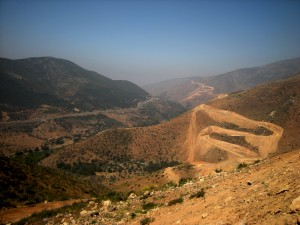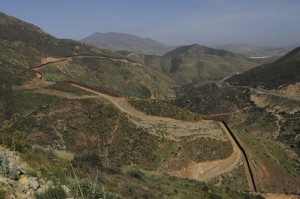Since when did people who protect our wildlands become the enemy? That’s exactly what the sponsors of a new bill in the House of Representatives want us to believe.
Touted as a “border bill,” the omnibus bill HR 2578, titled Conservation and Economic Growth Act, rolls together 14 bills and would give the Department of Homeland Security complete control over public lands in all United States territory, not just along the border. A provision of the bill, sponsored by Rob Bishop (R-UT) would waive 36 key federal law protecting the environmental, tribal lands, wildlife protection laws in a 100-mile zone along both U.S. northern and southern borders.
The new omnibus bill is coming up before the House of Representatives on Monday and will be voted on by Tuesday.
The bill is extreme, misleading, and will do nothing to protect the environment or our borders. I stand with millions of others in opposition to this bill.
Ranchers, farmers, hunters and hikers unite to oppose this bill
An OP-ED was published in the LA Times this morning by a farmer and a rancher opposing this bill.
Arlo Skari, a farmer in Montana and John Ladd, a rancher in Arizona know that good land stewardship is deeply embedded in the American way of life. That’s why they are against this bill. They write:
With more than a century between us of working the land, farming and ranching are in our blood. We work 1,500 miles apart — one near the Mexico border, one near the Canada line — but we share a lifestyle rooted in being stewards of America’s borderlands.
As border-area landowners, we strongly oppose two bills pending in Congress: HR 1505, sponsored by Rep. Rob Bishop (R-Utah) and S 803, cosponsored by Sens. John McCain (R-Ariz.), Jon Kyl (R-Ariz.) and Marco Rubio (R-Fla.).
We support the Border Patrol’s mission to secure our borders. We also strongly believe that compliance with laws and regulations is key to ensuring that the rights of borderland landowners and rural communities are protected as the agency carries out that mission. But our natural heritage does not need to be sacrificed for the Department of Homeland Security and the Border Patrol to do their jobs.
An answer looking for a problem
And the thing is—nobody who actually works in the borderlands thinks this bill is necessary either. The Department of Homeland Security and the Border Patrol have come out with public statements opposing the bill.
In testimony last year, DHS explained that they have developed a close, cooperative relationship with land managers of public lands. Border security and environmental protection work hand in hand, and this has never been in doubt. Thus, this bill is not necessary for the fulfillment of border security objectives.
H.R. 1505 would override multiagency coordination that has been occurring on Federal lands since a 2006 Memorandum of Agreement between the Departments of Homeland Security, Interior, and Agriculture that has led to increased cooperation and leveraged resources.
Despite some delays reported due to compliance with environmental laws, 22 out of 26 Border Patrol stations on the southern border with Mexico report that the border security status (or “operational control”) of their area of operation has not been affected by land management laws. Such a sweeping waiver of environmental laws, especially laws such as the National Environmental Policy Act that require interagency consultation, would result in a dramatic decrease in interagency coordination, consultation and trust – all key ingredients to improving national security along our borders.
Deputy Chief Ronald Vitiello of U.S. Customs and Border Protection spoke to the House Committee on Natural Resources last year, explaining that they don’t need this bill. They already cooperate with land managers, and that cooperation is essential to protect our borders.
Instead, factors like rugged terrain—and not access delays or restrictions—have the highest impact on operational control. Of the four border stations that reported having been impacted, two of the stations did not even request additional resources or assistance to deal with the problem, and the two that did request help were denied by U.S. Customs and Border patrol because of budget constraints and other, higher-ranked priorities.
If the sponsors of this bill are so worried about protecting our borders, why don’t they listen to the border patrol?
Opposition to the bill: widespread, bipartisan rejection
Likewise, Americans coming from all kinds of political perspectives are opposed to this bill.
In San Diego, local veteran Mark Starr stands up in opposition to this bill in an OP-ED in the San Diego Union-Tribune. Starr writes:
“As a veteran of both the Iraq and Persian Gulf wars, I understand firsthand the need to protect our country from all enemies and ensure our safety with strong security along our borders. I fought to make our nation more secure and I know that threats are, unfortunately, a daily reality of the 21st century.
“Given this, it disappoints me all the more to see legislation put forward under the false guise of national security that will do little to make our country safer.
“As a veteran, a patriot of this nation and a Californian, I can’t stand by while these lands are threatened. I’m proud to have worn this country’s uniform and I want to continue serving. That’s why I’ve chosen to follow in the path of the great Teddy Roosevelt – a man who was both a soldier and a conservationist – and stand up for our public lands.”
Read Mark Starr’s moving story here….
Environmental organizations like the Sierra Club and Defenders of Wildlife point out that the bill would endanger America’s precious wildlands and compromise important wildlife corridors.
The Alaskan Sitka Convervation Society calls it “The- Worst Bills For The Environment in Congress Wrapped Into One Act of 2012.” Reading the bill carefully, the society’s members show how legislation that will gut the environment masquerades here as environmental protection:
“It includes such cynically titled acts such as the “Grazing Improvement Act of 2012” which allow grazing to continue on lands where cows shouldn’t even be roaming and puts grazing permits outside of environment review. It also includes the beautifully named “Preserve Access to Cape Hatteras National Seashore Act” which sounds good, but in reality is meant to open miles of critical beach habitat for piping plovers to ATVs, Dune Buggies, and other off road vehicles. Good luck plovers!”
Even Red State conservatives reject this bill, arguing that the bill is “bad news for Republicans and conservatives.” Commentator S.E. Robinson on RedState.com points out that:
“The Southeast Alaska Native Land Entitlement Finalization and Jobs Act (H.R.1408) is one of 14 measures currently included in the bill. If passed, H.R.1408 will grant portions of Alaska’s Tongass National Forest to Sealaska Corporation of Juneau, allowing them to chop down trees that started growing before the Revolutionary War.”
ACTION ALERT by SIERRA CLUB
Click here to send a message to Congress: we can support our border patrol, our land managers and our local communities. We can protect our borders and our wildlands without destroying what we are trying to preserve.
And call your local Congressmember now. Vote NO on HR 2578, an unnecessary bill that’s just bad legislation all around.



Looks like this would include not only big bend and the parks of the southwest, but also Acadia, boundary waters and voyager, cascades, possibly Olympic and many more beautiful areas. Don’t let homeland security be the latest excuse to rip apart our national parks!
Yes, DHS has completing the scoping process for the Northern Border and prepared all the EIS in the summer of 2010. From what I can see, almost no one is paying any attention except locals in various places along the northern border with Canada. If this bill passes in the Senate, communities along both northern and southern borders will only learn about this legislation after a construction project starts rolling in.
You can also ask the Senate to say “no” to HR 2578 here: http://www.change.org/petitions/save-public-lands-stop-hr-2578 — and I encourage you to do so. The Senate Committee on Energy and Natural Resources might opt to dismiss this piece of legislation — but let’s help spur them in that direction by adding the weight of our voices. Why? Aside from the reasons listed on the petition, because this legislation passed through the House of Representatives far too easily.
Thanks so much for this link, Liz! And yes, this passed through Congress far too quickly, in part because a few congressmen from non-border states have worked for two years to whip up hysteria about border security. Now more than ever, we need to speak out, and make our voices heard! I’m going to add this link to my blog post as an update.